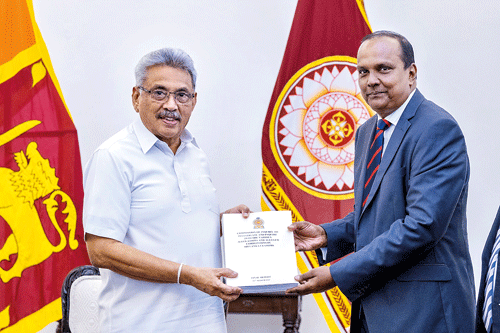News
Digitalisation, more cameras to minimise Customs corruption

The 530-page report was handed over to President Gotabaya on Tuesday
A commission that studied operations at Sri Lanka Customs has proposed significant digitalisation and targeted CCTV installation to minimise corruption.
Electronic monitoring of bulk cargo, introduction of GPS for trucks and online verification facilities are among the 117 recommendations. The Commission of Inquiry into Customs was appointed by President Gotabaya Rajapaksa in February last year.
The 530-page report handed over to the President on Tuesday by its Chairman, Supreme Court Judge Shiran Gooneratne, has proposed the appointment of a steering committee to monitor the implementation of the recommendations.
The commission’s other members were Court of Appeal President Justice Priyantha Fernando, High Court Judge Damith Thotawatte, Central Bank Deputy Governor K.M.M. Siriwardena (Current Finance Secretary), Senior Adviser (Trade) Dr. Sanath Jayanetti and the Customs’ former Additional Director General P.A. Dias.
The recommendations include paperless documentation, streamlining of booking systems, pre-arrival declarations to ease document processing and a GPS system for trucks approved to transport containers. The commission’s interim report had directed to install CCTV systems to enhance security and minimise corruption. However, the commission notes the cameras already in place do not function or have not been installed in suggested locations. Establishing online verification facilities to check the validity of documents–including the authenticity of claimed waivers– with several ministries and departments is also one of the recommendations. There are proposals related to clearing new and used vehicles. They include linking of regulatory authorities and allowing for verification of certificates such as letters of credit, pre-inspection certificates and bills of lading.
Separately, an online facility to verify pre-shipment certifications is also suggested, along with the direct mailing of all certificates to Customs by the issuing agencies. There must be automated systems to identify high-risk consignments. And Customs officials in the valuation directorate must be retained for at least three years.
The recommendations also focus on improving post-audit clearance. For instance, they call for the completion of investigations into around 300 vehicles that had been handed over to the Central Investigations Bureau and harmonisation of work between the Inland Revenue Department and Customs.
The commission suggests that outdated baggage scanners must be replaced with scanners with modern technology and image analytical facilities, portable baggage scanners and body scanners. An advanced passenger information system could assist in preventing drug trafficking, it notes.
A method must be introduced to track cargo movement from the bonded warehouses to port and vice versa. On Customs investigations and inquiries, it is proposed that when cargo is seized or detained, the Central Investigation Directorate must be informed. A Central Case Registry must be maintained.
The employment of retired Judicial Officers–a panel of 10 for a three-year period–is suggested to maintain impartiality into inquiries on Customs offences. This could also stem abuse of authority by Customs officers. A Dispute Resolution Directorate is proposed along with an Appellate Tribunal to tackle disputes.
The commission recommends that the Registrar of Companies be vigilant of rogue companies being set up. This will minimise fraudulent disclosures such as names and addresses.
The use of fingerprint machines must be given the highest priority and implemented immediately. This was based on revelations that some of the officers do not report on time and that attendance registers are not properly maintained. There must be strict compliance with working hours so that overtime (OT) hours could be calculated accordingly.
The commission suggests that unlawful OT payments be discontinued and, if claimed, that the submitting officer and the approving officer be held liable.
Most Customs officials prioritise financial benefits above work responsibilities, the commission observes, and the present system of OT, panel and reward payments as well as the transfer scheme are geared towards this. Some payments do not even have proper approvals, the commission notes.
The best way to say that you found the home of your dreams is by finding it on Hitad.lk. We have listings for apartments for sale or rent in Sri Lanka, no matter what locale you're looking for! Whether you live in Colombo, Galle, Kandy, Matara, Jaffna and more - we've got them all!

